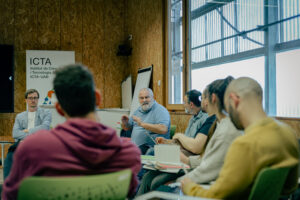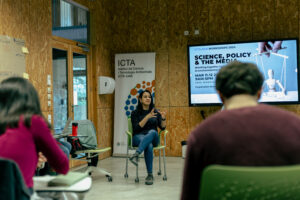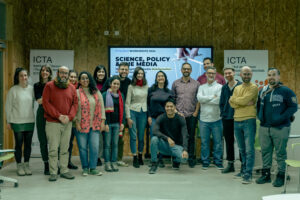Letícia Santos de Lima, Ph.D is a Brazilian environmental scientist currently based in Barcelona. She is an environmental engineer by training and holds a PhD degree in Geography, spending her career developing a very interdisciplinary profile.
Twitter/X handle: @Leticia_StLima
LinkedIn handle: Leticiaslima
Website: https://leticialima.weebly.com/outreach.html
Tell us about yourself! Career level when you started the Voices program and where you are now, where is your work based? What is your goal of your current work? Please explain in a way that non-scientists could understand.
I am passionate about socioenviron mental issues, particularly those connecting land, water and people. Some of my topics of research involve, for instance, the impacts of droughts in rural communities in the tropics, how effective watershed conservation programs can be, the effects of tropical deforestation on river flows, and so on.
I joined the Voices for Science program in 2022, the same year I started a postdoctoral position at the Institute of Environmental Science and Technology (ICTA – UAB), in Barcelona, Spain.
What encouraged you to join the Voices for Science program?
I always think about science as a service to society. The best we can offer are scientific findings produced with the highest standards of quality and ethics. However, for that to be really useful, we need to be able to communicate these findings to not only our scientific peers, but to society as a whole. That requires learning and practicing communication skills, and that was the main reason why I joined Voices for Science.
What was your communication or policy goal for your time in the program? Did it change throughout your year in the program? Did you achieve it?
My goals were 1) to be able to reach out to and interact with policymakers to support designing policies to protect the Amazon rural communities that have been struggling with climate extremes, and 2) design and push forward a workshop about the impacts of disinformation in environmental policies. These two goals unfolded differently…
In the first case, on the onset of an extreme drought that affected the Amazon at the end of 2023, I managed to write a formal letter directed to one particular politician that was leading an initiative to protect local communities. Seventy other environmental scientists in Brazil signed the letter. That letter was mentioned in the media, but I never got an answer back from the politician. Although that was a frustrating experience, I’ve learned a lot from it, for example: to not rely on only one contact between you and the target politician, to not send the letter only to one representative, but to spread it to various committees in congress, to ask support from journalists to put pressure on the policymakers, and to keep a step ahead of the very fast events involved when you have a climate emergency.
Following that letter, together with three other colleagues, we wrote a correspondence piece to Nature regarding the urgency of better policies to support rural communities facing the extreme drought. This was my first experience publishing a scientific correspondence of that kind, and it helped me to understand the different ways scientists can call attention to urgent matters.
The second goal — the disinformation in environmental policies workshop — was a great experience. I felt really encouraged to pursue this idea by the mentoring that I received from the Voices for Science program. The idea was to explore the impacts of disinformation on environmental policies and how scientists, journalists, and policymakers can work together to tackle this issue. In essence, it was truly a transdisciplinary experience that connected a lot with the goals of the Voices for Science program. It took me a lot of effort and time to prepare it, but I managed to gather a group of 30 participants and speakers that included not only scientists in different career stages, but also journalists and policymakers. During two full days, we explored case studies, identified tactics used by disinformation perpetrators, and learnt from numerous examples of initiatives and strategies to counteract it. We had journalists talking about media literacy for teenagers, policy experts presenting initiatives to connect journalists and policymakers, fact checkers explaining the procedures they follow to debunk disinformation, and several debates with participants and speakers. Participants reported a very high degree of satisfaction with the workshop, and, on top of that, 15 participants and speakers joined me on the task of developing a perspective paper on the issue. The experience of working collectively on a transdisciplinary article has been incredible!
As a plus to my efforts to communicate science to a broader audience, I gave interviews to three newspapers (a Spanish, a Catalan, and a Brazilian one) and to a radio show in Spain.
What makes me prouder, though, is a 1-page comic for kids that I drew based on a narrative about the droughts in the Amazon that we developed with a group of five colleagues from Latin America. The comics are designed as a colouring project and can be easily printed and used in schools. It is now freely available on the internet, and it is part of a chapter in a free e-book that was designed for a broader audience as well. I also participated in two short stories for the Instagram account of my institute: one was talking seriously about the extreme drought of 2023, but the other was a very funny one following the trend “Of course…” on the internet (links below).
Click this link to download the comics.
What impact has the program had on you and/or the community you are engaging with? How has Voices helped strengthen your science policy and communication skills & knowledge? Did anything surprise you about this program? What was your most memorable moment of the program?

I enjoyed so many aspects of the Voices for Science program… first and above all was the mentorship process. Through the regular meetings we were able to exchange ideas, report our achievements, and overcome challenges. Another aspect that I loved was that our trainings were really well-organized, brief, and straight-to-the-point — that is really helpful when you already have a busy agenda with other things to do.
I also learned several useful tools and strategies for science communication and outreach through different webinars: for instance, how to showcase your research outcomes through a one-pager, how to write a policy brief, the basics of science storytelling… On top of that, all supporting materials are available for us even after our participation in the program ends.
My most memorable moment in the program was the great opportunity I had to finally meet my mentors in person: because I am part of the EU/UK cohort, the whole mentorship process was online, but on one occasion I was in the US and I reached out to my mentors Liz and Sophie, and we had a great time over a coffee, exchanging ideas about the outcomes of my participation in the program. That day they also invited me to participate in a happy hour at the AGU to welcome the new US cohort and met other colleagues in person.
Is there anything you would tell someone interested in joining or taking their first steps in science advocacy or communication?
I would certainly recommend them to rely on the power of the collectives and the mentorship provided by programs like Voices for Science. Working with our peers gives us several benefits:
- It encourages us to face anxiety-inducing situations like giving an interview
- Celebrating our peers’ achievements gives us motivation to pursue our own communication goals. When we exchange our experiences in a group, each reported outcome becomes an inspiration, and each failure becomes a learning experience to everyone.
- Also, when our science advocacy is based on a collective of scientists rather than in one or two individuals, it gives us more power to communicate our message and build trust between citizens and scientists.
——————————-
Photo credits: Balam Castro












/https://tf-cmsv2-smithsonianmag-media.s3.amazonaws.com/filer_public/34/31/3431771d-41e2-4f97-aed2-c5f1df5295da/gettyimages-1441066266_web.jpg)








Discussion about this post